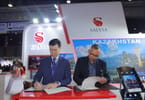ב. אתגרים מיוחדים לענף המלונאות
בנוסף לדאגה לגבי התועלת וההשוואה הכללית של פליטות Scope 3, איסוף ואימות של Scope 3 מאתגרים באופן ייחודי עבור תעשיית המלונאות.
הכלל מזהה 15 קטגוריות של פליטות Scope 3 כמתואר בפרוטוקול GHG, רובן תלויות במידה משתנה בצדדים שלישיים בהינתן השכיחות של מודל הניהול והזכיינות, כפי שנדון לעיל. ואכן, ה-SEC הכירה באותה מידה בכלל הקובע כי "השגת הנתונים הדרושים לחישוב פליטות Scope 3 של רושם עשויה להיות מאתגרת מאחר שרוב הנתונים צפויים להיות בשליטת צדדים שלישיים."
הדבר החשוב ביותר לחברים שלנו הוא הכללת:
- "זכיינות" של נרשם ו
- "מוצרים ושירותים שנרכשו" ברשימת הפעילויות בהיקף 3.
אנו פונים לכל אחד בתורו.
איסוף מזכיינים וחברות ניהול
דרישה מהנרשמים לכלול פליטות שהופקו מזכיינים כחלק מהגילויים שלהם בהיקף 3 מציבה אתגרים משמעותיים עבור מותגי המלונות, REITS ובעלים אחרים.
כפי שמתואר בסעיף הרקע לעיל, בעוד שהמבנה הארגוני הספציפי שלהם עשוי להשתנות, רבים מהחברים שלנו מסתמכים במידה רבה על צדדים שלישיים להפעלת הנכסים שלהם.
אם נרשם כזה נדרש לחשוף את פליטות Scope 3 שלו, הוא יצטרך לקבל את הנתונים מהזכיין או מחברת הניהול, שאולי בעצמם יצטרכו להשיג אותם מהעסקים המקומיים המספקים סחורות ושירותים למלון.
זכיינים וחברות ניהול מהווים חלק משמעותי מהחברים הכוללים של AHLA. חברות אלו הן לרוב קטנות ובניהול פרטי, ולפיכך לא היו כפופות לדרישות הגילוי של ה-SEC.
אנו מודאגים באופן ייחודי מהתפקיד שגופים אלה יידרשו למלא בתהליך החשיפה האקלימית ומהעומסים שיוטל עליהם למרות שלא היו מגישים לציבור. כישופים המפקחים על הפעילות השוטפת של בית מלון, הם מפעילים שליטה משמעותית על הנכס, לרבות רכישת האנרגיה והשימוש בו, אם כי ההיקף משתנה בהתאם לתנאי החוזה.
על מנת לעמוד בחובות הדיווח של החברה הציבורית שלהם, ייתכן שמותגי מלונות ציבוריים ו-REIT יצטרכו להטיל דרישות משמעותיות יותר מזכיינים ומפעילי מלונות לנתונים הקשורים לאקלים.
הדינמיקה הזו יוצרת מכשולי איסוף רציניים הן עבור הנרשמים והן עבור צדדים שלישיים עליהם הם מסתמכים.
החשש העיקרי הוא שלזכיינים וחברות ניהול רבים חסרים המשאבים והכוח אדם הדרושים ליישום ולתחזק תוכנית איסוף ודיווח נתונים בקנה מידה ובפירוט הדרושים לבעלי ציבור ומותגים כדי לעמוד במשטר החשיפה המוצע של ה-SEC.
השגת הנתונים הדרושים לחישוב וחשיפת פליטות Scope 3 תדרוש רמה של תיאום ופיקוח מחברי המותג/בעלים שלנו, שאינה ברת קיימא, במיוחד עבור אלה שיש להם מאות או אלפי נכסים ברחבי העולם.
האימות והאמינות של הנתונים מעוררים דאגה שווה, שכן, שוב, סביר להניח שלישויות צד שלישי אלה לא יהיו המשאבים לאמת את הנתונים הללו בכל רמת ודאות מספיקה להגשת ה-SEC.
אפילו חברי הנרשמים הגדולים שלנו שהתחייבו ליעדי הפחתת Scope 3 עדיין עובדים על חידוד תהליכי איסוף הנתונים ואימותם.
דרישה לאותה רמת דיוק מעסקים קטנים ופרטיים שאם לא כן לא הייתה מחויבת לפי כלל זה היא מכבידה ביותר, ובמקרים מסוימים בלתי אפשרית להשגה. בשל שוק העבודה הקשה, רבים מחברינו נאבקים לאייש משרות פתוחות במלונות שלהם, מה שהפך את זה למאתגר יותר ויותר עבור עמיתים במלונות לספק אפילו שירותי מלונאות בסיסיים.
מעקב מדויק אחר נתוני Scope 1 ו- Scope 2 לרמה הנדרשת לדיווח כספי יוסיף לעומס העבודה הזה.
שכבת הדרישה לאסוף ולאמת פליטות Scope 3 תטיל עומס מופרז על אותם שותפים ואף עשויה לחייב בתי מלון מסוימים לשכור צוות נוסף, סיכוי מאתגר ויקר בשוק העבודה הנוכחי.
איסוף מספקי מוצרים ושירותים
בדומה לאתגרים הניכרים שיתמודדו חברינו בדיווח על פליטות Scope 3 שלהם, איסוף נתונים ואימות עבור סחורות ושירותים שנרכשו של רושם הוא כמעט בלתי אפשרי.
Purchased goods and services can frequently be one of the larger Scope 3 categories for many hotels.
Cleaning services, transportation, food, supplies, and entertainment represent broad categories encompassing hundreds if not thousands of individual emissions that make up a registrant’s Scope 3 inventory.
Regardless of ownership structure, category, or class, all our members rely heavily on a broad network of suppliers and vendors to support their hotels.
Access to supply chain information across the hotels within the U.S. is already challenging, but members who are global companies also are faced with added complications of supply chains for hotels based all over the world.
Further, the suppliers our members depend on are overwhelmingly small, local companies that have been hit the hardest during the pandemic and continue to struggle amidst current labor trends. Like private operators and franchisees, these entities would not be subject to the SEC’s disclosure regime but for their contractual relationships with our public members.
While many of our members have pursued these local and diverse sourcing practices for decades, others have more recently embraced similar commitments as part of their broader Diversity, Equity, and Inclusion (DEI) efforts.
Similarly, travel and tourism companies are exerting increasing pressure on hotels to support local destinations by buying local and supporting small businesses.
Given their small, private structure, such suppliers overwhelmingly lack the resources, staff, and expertise to provide registrants with the extensive amount of reliable Scope 1 and Scope 2 emissions data that our members would be comfortable submitting as part of their SEC filings.
Indeed, many of these suppliers are located all across the globe in countries that may be years behind on any climate-related requirements.
Further, registrants may feel pressured to shift their purchase of goods and services to larger, more established entities with the resources and capacity to track and report this data with a higher level of assurance.
Scope 3 methodologies are still evolving and, as discussed above, there are significant practical limitations on our members’ ability to collect and assess Scope 3 emissions data at the level required by the Rule for properties that they do not own and/or operate.
AHLA, therefore, requests that the SEC eliminate the requirements to disclose all Scope 3 emissions. If SEC-mandated Scope 3 reporting is required at all, this data should be furnished in a separate report, rather than filed and a longer compliance period should be permitted to align disclosures with the available data (9-12 months after each calendar year).
Doing so would encourage registrants to develop and refine their Scope 3 collection programs without the added burden and associated liability of filing these figures.
2. רמות הבטחון הנדרשות יהיו עלות אוסרניות וכמעט בלתי אפשריות עבור חברי AHLA להשיג; על ה-SEC לבטל את כל ההבטחות הנדרשות.
The Rule includes a proposed phased approach for a registrant to file an attestation report covering its Scope 1 and 2 emissions. It begins by requiring large accelerated filers to provide “limited assurance” of their emissions beginning Year 2, then expands to require “reasonable assurance” for Year 4 and beyond.
Registrants would also be required to use a service provider that satisfies specified qualifications and includes certain disclosures about the provider.
Obtaining “limited assurance” is a time- and resource-intensive process that would consume a large proportion of our members’ sustainability budgets.
Demanding “reasonable assurance” would impose a much higher bar for registrants to achieve, requiring significantly more resources and increased costs.
Our members are already facing challenges procuring the necessary support, a challenge that will likely be exacerbated as the Rule produces an influx of new companies that are required to provide these reports in their filings.
While AHLA fully supports the goal of ensuring the data reported is as reliable and comparable as possible, obtaining the levels of assurance required by the Rule would impose unreasonable burdens on our members and is nearly impossible for our members to obtain in the timeframe articulated in the Rule.
We, therefore, believe the SEC should eliminate all required assurances or, at the most, require attestation reports that provide “limited assurance” beginning Year 4.
Financial Statement Metrics
3. הסף של 1% לגילוי ההשפעה המוחלטת של אירועי מזג אוויר קשים ופעילויות מעבר על פריטי שורה מוגדרים ידרוש רמת דיוק שאינה מעשית ולא תספק מידע בעל ערך למשקיעים; על ה-SEC להסיר את הדרישה הזו לחלוטין.
For consolidated financial statements that would otherwise be included in the Rule’s specified disclosure forms, registrants must include a note describing the financial impact of severe weather events, transition activities, and any mitigating expenditures and opportunities on a relevant line item if the absolute value of those impacts is 1% or more of the total line item.
Performing such a precise calculation, particularly for impacts inherently based on extensive estimates and assumptions, would be nearly impossible to achieve even for our largest members.
In addition, the standard does not track with the materiality principle which is used for all other financial statement footnotes and underpins the rest of the requirements in the Rule.
The amount of judgment and estimation required to determine if an event or activity was climate-related, let alone whether it would have a 1% impact, would be excessively costly, practically impossible, and would not ultimately yield decision-worthy information for investors.
The concepts targeted in these line item impacts are better served outside the pages of our members’ financial statements. AHLA, therefore, urges the SEC to eliminate the line item disclosure requirement entirely.
If the requirement is retained in some fashion, the relevant measure should be materiality consistent with all other requirements in the Rule, not an arbitrary percentage.
4. ה-SEC צריך לספק בהירות רבה יותר על מושגי מפתח שעל הנרשמים לדווח עליהם, כולל מה מהווה הוצאה הקשורה לאקלים, סיכון ופעילות מעבר.
If the SEC requires registrants to include the impact of climate-related events in their financial statement footnotes or other documents, one overarching point of confusion raised by our members concerns the inclusion of the concepts of “climate-related” and “transition activities” in our members’ financial filings.
For instance, the Rule describes climate-related “expenditures” as capital costs incurred to mitigate risks from severe weather events and other natural conditions, as well as costs incurred to reduce GHG emissions or otherwise mitigate exposure to transition risk.
The Rule does not provide guidance on how to assess expenditures that may have multiple purposes or where the climate impact was not a predominant factor in the determination.
מה לקחת מהמאמר הזה:
- A primary concern is that many franchisees and management companies lack the resources and personnel needed to implement and maintain a data collection and reporting program at the scale and granularity needed for public owners and brands to satisfy the SEC's proposed disclosure regime.
- אם נרשם כזה נדרש לחשוף את פליטות Scope 3 שלו, הוא יצטרך לקבל את הנתונים מהזכיין או מחברת הניהול, שאולי בעצמם יצטרכו להשיג אותם מהעסקים המקומיים המספקים סחורות ושירותים למלון.
- The Rule identifies 15 categories of Scope 3 emissions as outlined in the GHG Protocol, the majority of which would depend to a varying extent on third parties given the prevalence of the management and franchise model, as discussed above.






















